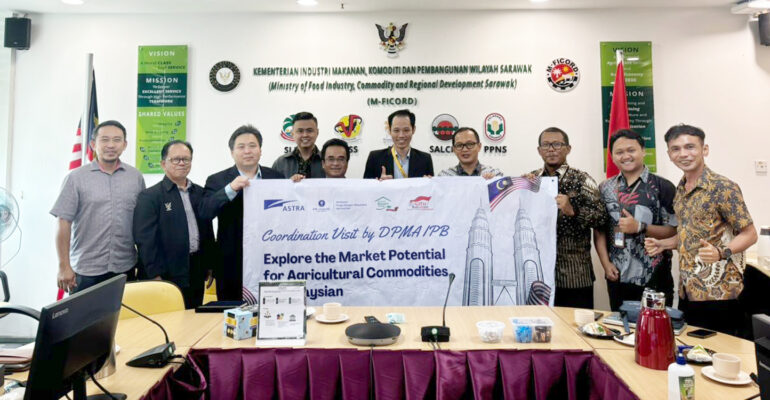DPMA IPB University Explores Agricultural Commodity Export Cooperation in Malaysia

The Directorate of Agromaritime Community Development (DPMA) of IPB University conducted a strategic visit to the Ministry of Food Industry, Commodity, and Regional Development (M-FICORD) in Kuching, Malaysia.
This visit was the first step in exploring cooperation to expand the market for Indonesia’s superior agricultural commodities in Malaysia. This activity was carried out in order to support the Desa Sejahtera Astra (DSA) 2024 program, which aims to improve the welfare of rural communities through optimizing the agricultural sector.
The IPB University delegation was led by Dr Mohammad Iqbal Irfany, Assistant Director of Social Entrepreneurship, who was welcomed directly by Tuan Sayed Ismail Nasiruddin Bin Dato’ Sri Wan Hashim, Vice Permanent Secretary and Head of Management Services Division at M-FICORD.
The discussion began with an introduction to IPB University as one of the leading universities in Indonesia, particularly in agricultural innovation and community development. Dr Iqbal explained various excellent programs of IPB University, including the active role in fostering villages based on agricultural entrepreneurship.
In the discussion session, M-FICORD explained the great potential of the agricultural commodity market in Malaysia. They highlighted the high demand for quality fresh produce, such as kepok banana, sweet potato, and dragon fruit.
IPB University and M-FICORD then discussed strategic opportunities to collaborate in the development and export of this commodity, as well as designing a sustainable marketing strategy.
This cooperation is in line with the vision of IPB University and PT Astra International Tbk to empower farmers in Sambas Regency, West Kalimantan, as an area that has great potential in agricultural commodity production.
“Through the DSA program, IPB University has made various efforts, including technical training, agribusiness assistance, and strengthening the supply chain. The exploration of this cooperation is expected to provide added value to local products while opening international market access for farmers,” said Dr Iqbal.
In addition to discussing export potential, the visit also served as an exchange of knowledge and experience between the two institutions. Both parties agreed to establish further communication to realize concrete steps that can support the common goal of improving the welfare of farmers while meeting the needs of the Malaysian market for quality products.
Dr Iqbal emphasized that this collaborative step is expected to not only support village economic development in Sambas, but also become a model of synergy between academics, the private sector, and the government in encouraging sustainable agriculture-based development. “With joint efforts, the great potential of Indonesia’s local commodities can be optimized, bringing economic and social benefits to the wider community,” he concluded. (*/Rz) (IAAS/Hap)



